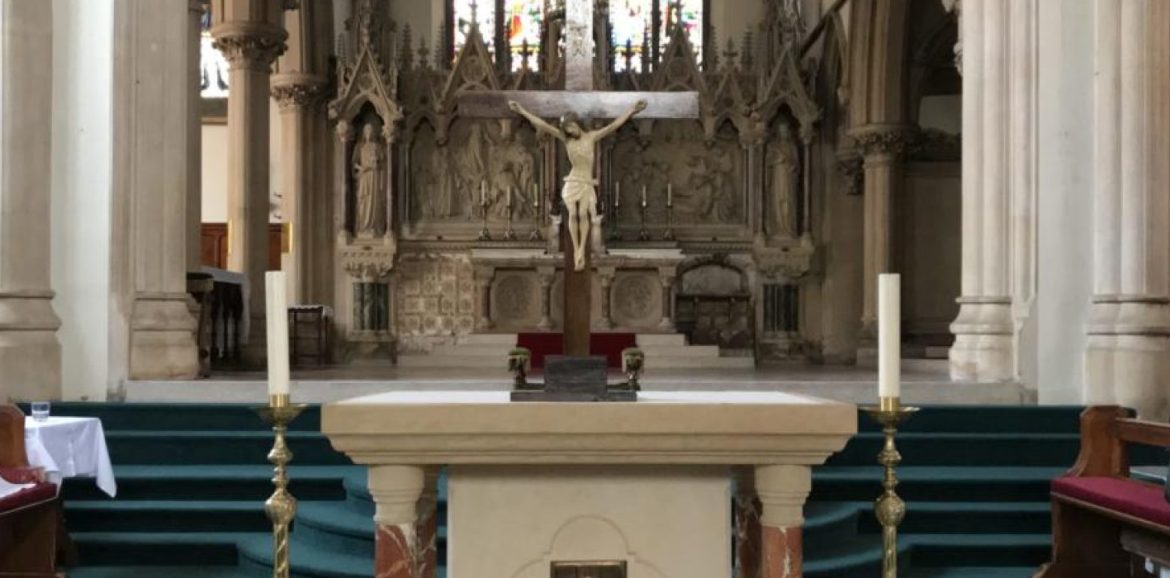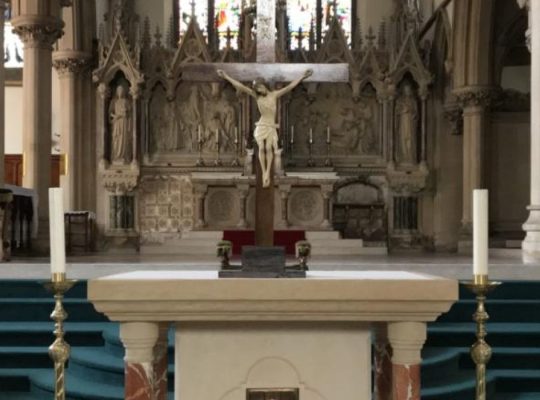Just a thought
Today we read the passage in Peter’s second discourse, where he announces the Lord’s resurrection.
‘The God of Abraham, [the God] of Isaac, and [the God] of Jacob, the God of our ancestors, has glorified his servant Jesus…..’ Jesus’ resurrection is the summit toward which salvation history has tended since the beginning, the fulfilment of divine revelation throughout the centuries, the definitive liberation prefigured by the deliverance from Egypt; and the first of the five titles Peter gives to Jesus in this discourse is ‘servant.’ This title is particularly meaningful, for it refers to the four great songs in the Book of Consolation (Isaiah), the coming of a persecuted Chosen One whom God will make victorious and who, by his sufferings, will obtain salvation for the nations.
Jesus has been ‘disowned’, and ‘put to death,’ he who was’ the Holy and Righteous One,’ ‘the author of life.’ To proclaim these titles while recalling the fate suffered by the one who bears them is a profession of faith; it is to confess God’s infinite mercy and love as well as the sin of those who have not yet recognized God’s messenger. It is also to recognise with thanksgiving the divine power: nothing can prevent it from completing the work of salvation. God knew that the Messiah would suffer. Because of his love for us, he took that risk. But death did not have the final word: ‘God raised’ the broken body of Calvary. This is the good news that the apostles proclaim, to which they testify in the midst of the people.
Speaking to those who had seen what had happened to Jesus, Peter addresses them directly: ‘You denied the Holy and Righteous One and asked that a murderer be released to you. The author of life you put to death.’ At this moment, how could he speak otherwise, saying ‘one’ or ‘they’? This does not mean that the apostle is accusing his hearers of being personally guilty of the death of the ‘servant of God,’ ‘the Holy and Righteous One,’ ‘the author of life,’ ‘the Messiah.’ Did not Peter himself deny Jesus? Nor does he make them bear the weight of collective responsibility. He recalls only the deeds that took place in the city, whose inhabitants were thereby to some extent involved. Peter’s apostrophe must make us look at ourselves, making us humble through our recognition of our part in the sin of a violent world where the just continue to be rejected and killed, as was the Just man. We tend to make others—’one,’ ‘they’ —bear the blame for faults and sins committed by a society, a community, or a Church to which we belong, for better or for worse!
Peter immediately adds: ‘Now I know, brothers, that you acted out of ignorance, just as your leaders did.’ Yes even, ‘your leaders.’ It would thus be improper to accuse the people of having allowed themselves to be manipulated by wicked leaders. It is sad but true that sometimes—how, we do not know—ignorance and thoughtlessness reach such proportions. The history of all peoples furnishes sad examples of this. Yet no one is cursed with eternal malediction. How could it be otherwise for the Jewish people, considering their relationship to the merciful God who is faithful to his promises? So Peter’s invective ends with a vibrant call: ‘Repent, therefore, and be converted, that your sins may be wiped away!’
This call is addressed to everyone and particularly today to Christians assembled to celebrate the Lord’s passover. This is why we turn toward God to beg his forgiveness and at the same time sing our song of thanks: ‘O Lord, let the light of your countenance shine upon us!’
‘Now while he was with them at table, he took the bread and said the blessing; then he broke it and handed it to them. And their eyes were opened and they recognized him; but he had vanished from their sight. Then they said to each other, ‘Did not our hearts burn within us as he talked to us on the road and explained the scriptures to us.’’
So ends the narrative of the Gospel narrative for year A. This Sunday’s Gospel is the continuation of that same narrative. ‘[The disciples of Emmaus] recounted what had taken place on the way and how he was made known to them in the breaking of bread. While they were still speaking about this he stood in their midst…..’
The second part of the story demands as much attention as the first. It recapitulates what the evangelist, after, ‘investigating everything accurately anew…..{Writes it down} in an orderly sequence…..’,regards as having to be remembered of the resurrection appearances. Like the other evangelists, Luke presents the ‘official’ experience of the apostles, who doubtlessly saw the resurrected Jesus, in the framework of one appearance. Every believer can thus give a good account of the reliability of the teachings they have received.
It would be pointless to try to discover the actual number of resurrection appearances: clearly, neither the evangelists nor the apostolic writers bothered much about it. By contrast, the tradition has carefully preserved and passed on the testimony of the ‘official’ appearances, because they primarily deal with the Twelve. With Peter at their head, they are, as a group, the chosen witnesses of the Lord’s resurrection and ‘pillars’ of the Church whose mission it is to proclaim and testify to the mystery. This is essential. Throughout the Bible, believers have been a people gathered by God, not a greater or lesser number of individuals: it is in and for a people that God reveals himself. Likewise, Christ’s disciples form a community — the Church— united in the faith transmitted by the apostles who were chosen by Jesus and. Instituted by him as a ‘college.’
Last week we heard the story of Thomas, who was not in the upper room when Jesus first appeared. ‘The disciples said, we have seen the Lord, Thomas answered, Unless I see the holes that the nails made in his hands and can put my finger into the holes they made, and unless I can put my hand into his side, I refuse to believe.’ For this Thomas gets the title ‘Doubting Thomas.’ Quite unfairly in my opinion. As we see in today’s Gospel, all the apostles doubted— ‘They thought they were seeing a ghost’ Jesus had to say to them: ‘Look at my hands and feet; yes, it is I indeed. Touch me and see for yourselves……’ Perhaps it was the other apostles who had said to Thomas [although not recorded] ‘We have seen him and have put our fingers into the holes the nails have made in his hands….’ The evangelist, however, didn’t find it necessary to expand on the matter.
The privileged experience of the Twelve means first of all that they truly saw Jesus, and not some phantom or ‘spirit’, the product of their imagination or desire. The appearance of the resurrected surprised them, making them startled and terrified. He had to prove to them many times over that it really was he. Despite this, ‘they were still incredulous for joy and were amazed.’ He whom they had seen die was now ‘in their midst.’ Is it any wonder that they had doubts? Wouldn’t we? He showed them his crucified hands and feet, inviting them to touch him: ‘Touch me and see, because a ghost does not have flesh and bones as I have.’ At his request, they gave him ‘a piece of baked fish; he took it and ate it in front of them.’ One could hardly claim more concretely the identity of the resurrected and crucified— ‘It is really I’ —and the reality of his body. What is the nature of this body? The Gospels content themselves with saying, with no explanation, that it was not subject to the constraints of mortal bodies, such as that with which Jesus experienced death and burial. Henceforth, Jesus may come and go anywhere he pleases. Paul asks himself about our own resurrection: ‘With what kind of body will [the dead] come back?’ ‘A spiritual body,’ he responds. This likewise affirms the identity of the body before and after resurrection, though one can say no more without experience thereof. It is possible to verify that something, a profound and concrete reality, is so, though its full explanation cannot be grasped.
Doubts that persist, as the evangelist points out, even after the resurrection appearances, are laid to rest decisively, by the Scriptures. Luke recalls this in three sentences. Jesus himself, when he is still with the apostles, prepares them for what is going to happen to him: his sufferings, death, and resurrection. These events fulfilled—as they had to be—all that ‘referred to him in all the scriptures beginning with Moses and all the prophets.’ To cite these passages would be overly pedantic, they are strewn throughout the Gospels. Here, however, Luke speaks of them generally. Indeed, in Acts he shows how the apostolic preaching appeals over and over again to the testimony of Scripture. If one would read Lukes Gospel, one should follow it by a readingof Acts. The risen Jesus gave the apostles ‘understanding of the scriptures.’ The Church along with them receives the same gift in the Spirit. The New Testament cites its witnesses at a stroke, not bothering to quote from sacred texts, because its business is not to quote, but to announce the good news. It is the ending—passion and resurrection—that illuminates the life and person of Jesus. The apostles’ preaching shows that of all Scripture—ancient laws, history of God’s people, prophetic oracles, and above all the psalter—must be interpreted in the light of the risen Christ.
During his mortal life, Jesus could not proclaim the kingdom of God beyond the confines of the country where he lived. After the resurrection, though, such bonds are broken. Through the ministry of the apostles, his voice can echo throughout the earth, the good news being proclaimed in every tongue. The forgiveness of sins and the salvation that comes from the resurrected one can reach all those who believe in him from one end of the world to the other, even to the end of time.
Peter and the Gospel urge us to be mindful of what ‘the law of Moses and the prophets and psalms’ say about Jesus. The Lord’s resurrection remains a mystery but the resurrected is present ‘in the midst’ of the world and the Church. The apostles proclaim it, believers witness to it by their faith, conversion, and obedience to the commandments. Each Sunday, we, the Christian community experiences the grace and joy of coming together to feed and fortify its life by communicating in the Body and Blood of Christ.
‘Alleluia, alleluia, Lord Jesus, explain the scriptures to us. Make our hearts burn within us as you talk to us. Alleluia.’
‘Alleluia. He is risen.’


